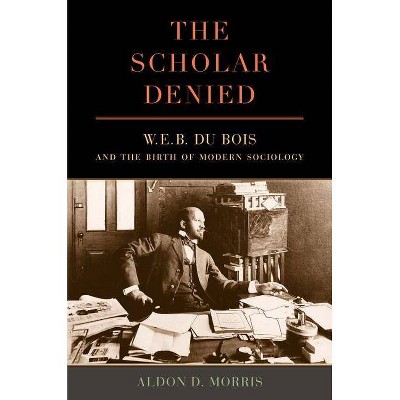A Dream Denied - by Michaela Soyer (Paperback)

Similar Products
Products of same category from the store
AllProduct info
<p/><br></br><p><b> About the Book </b></p></br></br>-'A Dream Denied' shows how the narrative of American Dream shapes the offending trajectories of twenty-three young Latino and African American men in Boston and Chicago. Believing in the American Dream helps the teenagers to cope with the pains of incarceration. However, without the ability to experience themselves as creative actors, reproducing the rhetoric of American meritocracy leaves the teenagers unprepared to negotiate the complex and frustrating process of desistance and reentry.<p/><br></br><p><b> Book Synopsis </b></p></br></br>Young minority men are often portrayed in popular media as victims of poverty and discrimination. <i>A Dream Denied </i>delves deeper, investigating the social and cultural implications of the "American dream" narrative for young minority men in the juvenile justice systems in Boston and Chicago. This book connects young male offenders' cycles of desistance and recidivism with normative assumptions about success and failure in American society, exposing a tragic disconnect between structural reality and juvenile justice policy. This book challenges us to reconsider how American society relates to its most vulnerable members, how it responds to their personal failures, and how it promises them a better future.<p/><br></br><p><b> From the Back Cover </b></p></br></br>"Soyer situates her analysis of young men's desistance efforts in a broader critique of the American myth of meritocracy. She skillfully weaves ethnographic data and social theory to show how the young men's lives are shaped by their social circumstances, juvenile justice system involvement, and the cultural narratives that rationalize and enable their marginalization. <i>A Dream Denied</i> expands our understanding of the complicated process of desistance and how it is shaped by inequality."--Andrea Leverentz, Professor of Sociology, University of Massachusetts Boston and author of <i>The Ex-Prisoner's Dilemma: How Women Negotiate Competing Narratives of Reentry and Desistance</i> <p/> "Too often research on troubled African American and Latino youth takes the perspective that they are incorrigible, unapologetic for their actions, or unaware of alternative ways of living. In<i> A Dream Denied</i>, Michela Soyer dispels this narrow vision by exploring the complex views about opportunity and desire for inner-city teenagers in the juvenile justice system. Soyer puts complex portraits of youth squarely in the middle of the debate about whether punishment or corrections at the systems level is all that needs to be attended to in regard to troubled youth of color in America."--Alford A. Young, Jr, Arthur F. Thurnau Professor of Sociology and of Afroamerican and African Studies, University of Michigan <p/> "<i>A Dream Denied p</i>rovides a fascinating look into the experiences of young black men in Boston's and Chicago's juvenile justice systems. This book as a whole offers something atypical: a highly theoretical, accessible, and captivating exploration of the lives of young men in two juvenile justice systems. By juxtaposing what the author calls 'automatic desistance' versus 'creative desistance, ' she complicates our understanding of leaving a life of crime and how that looks for different people, in different places and at different times."--Jerry Flores, Assistant Professor of Social Work and Criminal Justice, University of Washington Tacoma<p/><br></br><p><b> Review Quotes </b></p></br></br><br>"Michaela Soyer's <i>A Dream Denied: Incarceration, Recidivism, and Young Minority Men in America</i> provides an insightful reflection on the paradoxical roles of rehabilitation institutions and, through youths' own narratives and stories, vividly portrays the challenges faced by young minority men when trying to avoid recidivism and reincarceration."-- "American Journal of Sociology"<br><br>"Necessary reading."-- "Punishment and Society"<br><br>"One of the most profound findings of Soyer's book is how desperately these young people want to make a change in their lives... the connection of the American Dream mythology to institutions of change is a worthy contribution, and Soyer's critical gaze as a result of having grown up in Germany is unique."-- "Theoretical Criminology"<br><br>"The intricately detailed descriptions of the teenagers and their raw narratives are effective at telling a somber story. Soyer does an excellent job at showing why so many juveniles recidivate. In doing so, she contributes to a highly needed but surprisingly sparse area of developmental research that focuses on how systems influence juvenile reoffending and reentry."-- "Journal of Youth and Adolescence"<br><br>"Throughout her book, Michaela Soyer takes the reader into the communities and into the conversations with young men who were struggling so hard to cope with their incarceration and, even more so, their release. The intricately detailed descriptions of the teenagers and their raw narratives are effective at telling a somber story." <br> -- "Journal of Youth and Adolescence"<br><p/><br></br><p><b> About the Author </b></p></br></br><b>Michaela Soyer</b> is Assistant Professor in the Department of Sociology at Hunter College. <br>
Price History
Price Archive shows prices from various stores, lets you see history and find the cheapest. There is no actual sale on the website. For all support, inquiry and suggestion messagescommunication@pricearchive.us



![Access Denied [LP] - VINYL](https://pisces.bbystatic.com/image2/BestBuy_US/images/products/3498/34981161_so.jpg)
















